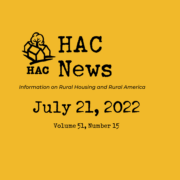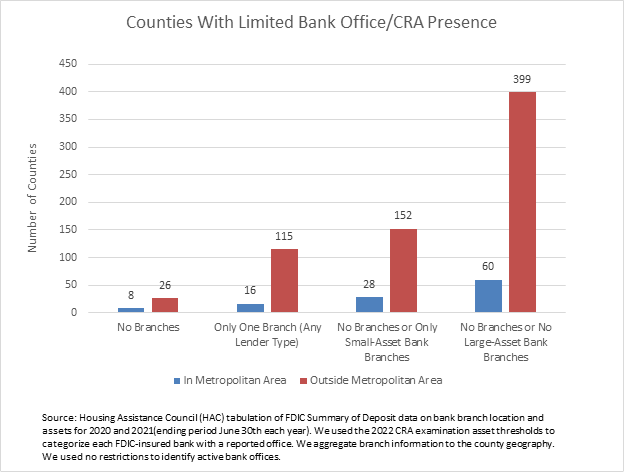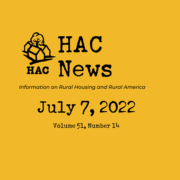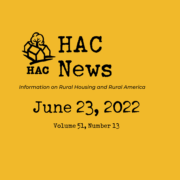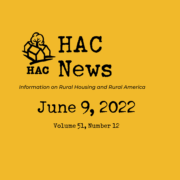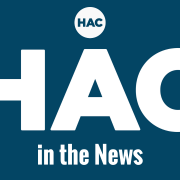TOP STORIES
White House releases housing supply plan.
Citing burdensome housing costs and a shortfall of available units, on May 16 the Biden-Harris Administration released a Housing Supply Action Plan that includes administrative and legislative proposals to improve existing housing finance mechanisms. It also calls on Congress to establish a Housing Supply Fund and incentivize zoning reform to accelerate the building of more housing nationwide. HAC’s statement on the plan applauds the administration for designing and including several provisions specifically with rural markets in mind.
Rural homelessness bill passes House committee.
The House Committee on Financial Services approved several bills on May 18 including the Flexibility in Addressing Rural Homelessness Act, H.R. 7196. The bill, introduced by Reps. Cindy Axne (D-IA) and Frank Lucas (R-OK), would give rural Continuums of Care more flexibility in using their funding, allowing them to pay for short-term emergency lodging, including in motels or hotels; repairs to make existing housing habitable; and capacity building.
Senate subcommittee hears Torres Small on rural housing.
On May 25, USDA Under Secretary for Rural Development Xochitl Torres Small appeared at a hearing titled Examining the U.S. Department of Agriculture’s Rural Housing Service, held by the Senate Banking Committee’s Housing Subcommittee. Her testimony focused on the importance of the funds and actions proposed in the administration’s budget request, including the Rural Partnership Program and support for rental preservation efforts. USDA will need $10 billion in the MPR preservation program by 2033 to preserve 137,000 units, she said; without “robust funding,” USDA will lose 333,780 of its approximately 400,000 rental units by 2050. Questions from Senators attending the hearing recognized the need for these units, the positive potential of the Section 502 Single Family Housing Direct Loan Relending Program for Native Americans, and opportunities to improve agency processes, staffing, and technology.
Vilsack appears before Senate committee.
USDA Secretary Tom Vilsack was the only witness at a May 26 Senate Agriculture Committee hearing on Opportunities and Challenges Facing Farmers, Families, and Rural Communities, which focused primarily on agriculture topics. Responding to Senators’ questions, Vilsack expressed a commitment to equity for Black and underserved stakeholders, support for immigration reform including the H-2A visa program, and intentions to hire additional Rural Development field staff if Congress appropriates the necessary funding.
Manufactured housing hearing set for May 26.
The House Transportation-HUD Appropriations Subcommittee is holding a hearing May 26 on Manufactured Housing: Supporting America’s Largest Unsubsidized Affordable Housing Stock, with HAC’s Director of Research and information, Lance George, among the witnesses. His testimony explains the importance of manufactured homes as affordable housing in rural America and the challenges facing manufactured housing residents, owners, and communities. It suggests that new research is needed to inform evidence-based solutions and that Congress could help address pressing challenges by providing grants for land acquisition by resident owned cooperatives, other mission-focused nonprofits, and public sector housing agencies, as well as financing for individual homeowners.
RuralSTAT
More than half of all manufactured homes are located in rural areas around the country and manufactured homes make up 14% of all occupied homes in rural and small-town communities. Source: Housing Assistance Council tabulations of the U.S. Census Bureau’s 2016-2020 American Community Survey.
OPPORTUNITIES
Housing Preservation Grants available.
USDA will make Section 533 Housing Preservation Grants to nonprofits, state and local governments, and tribes for repair or rehabilitation of rental or owner-occupied housing for low- and very low-income rural residents. Preapplications are due July 11. For more information, contact a USDA Rural Development State Office.
HUD offers service coordinator funds.
Nonprofits, PHAs, tribes, Tribally Designated Housing Entities, and resident associations can apply by July 18 for Resident Opportunity and Self-Sufficiency Service Coordinator grants to hire staff who assess the needs of public and Indian housing residents and link them to training and supportive services. For more information, contact HUD’s ROSS Program Office, 202-402-3624, ROSS-PIH@HUD.gov.
Owners of USDA-funded properties invited to host summer meals.
Rental housing and Community Facilities sites funded by USDA Rural Development can host the Summer Food Service Program operated by the Food and Nutrition Service for low-income children and teens. Local sponsoring organizations prepare the meals and deliver them. For more information, contact USDA Summer Food Service Program staff.
REGULATIONS AND FEDERAL AGENCIES
Census reports on accuracy of state-level data.
The Census Bureau’s Post-Enumeration Survey, one of the tools used to evaluate the accuracy of the 2020 Census, estimated there were no statistically significant undercounts or overcounts of population in 36 states and D.C., undercounts in six states, and overcounts in eight. Reliable estimates are not available for demographic characteristics or geographic areas within states. In March, Census reported estimated national undercounts for renters and Black or African American, American Indian or Alaska Native, some other race, and Hispanic or Latino populations, as well as children under age 5 and working age men. The remainder of the PES estimates, including results for housing units, and undercount and overcount rates for Puerto Rico, are expected to be released this summer.
Family Self-Sufficiency program changes implemented.
HUD has published a final rule putting 2018 legislative changes into effect for the Family Self-Sufficiency program. Revisions include expanding the definition of eligible families to include tenants of privately owned multifamily properties with Project-Based Rental Assistance. PHAs and property owners must comply with this rule by November 14. For more information related to public and Indian housing, email questions to FSS@hud.gov; related to privately owned properties, email MF_FSS@hud.gov.
Thompson confirmed as FHFA director.
On May 25, the Senate confirmed Sandra L. Thompson to serve a five-year term as director of the Federal Housing Finance Agency. She has been the agency’s acting director since June 2021.
Placemaking toolkit offered.
USDA and the University of Kentucky’s Community and Economic Development Initiative of Kentucky have created a digital Rural America Placemaking Toolkit intended to help rural leaders build placemaking plans. It covers conducting assessments, provides examples of placemaking projects, and includes information about technical assistance providers, funders, and resources.
Guidance covers design/build and construction management for USDA Community Facilities.
Replacing earlier guidance that has expired, USDA explains the process of obtaining agency approval for use of design/build or construction management services for Community Facilities projects. While USDA allows for the contracting of such all-in-one services, when the contract exceeds $250,000 prior approval must be obtained from the National Office. For more information, contact a USDA Rural Development State Office.
USDA tenant data shows emergency aid dramatically reduced cost burden.
USDA’s annual report on the characteristics of tenants in Section 515 and 514 properties shows that in October 2021 there were 108 fewer Section 515 properties and 25 fewer farm labor housing properties than in 2020, a total reduction of 1,709 units. The average household income rose by 3.78% to $14,665. Tenant households receiving Section 521 Rental Assistance saw a 7.13% increase in income to $12,501. The number of resident households paying more than 30 percent of their income for rent fell sharply from 41,121 in 2020 to 3,227 in 2021. USDA attributed this 92% decrease to the emergency rental assistance funds made available because of the coronavirus pandemic.
PUBLICATIONS AND MEDIA
Wildfire risk calculated across the U.S.
First Street Foundation has developed a model to estimate the risk of wildfire on a property-by-property basis across the U.S. now and up to 30 years in the future. Reports by the New York Times and Washington Post use First Street’s data to create interactive maps and graphics. First Street’s online Risk Factor tool also includes information about flood risk.
Local nonprofit capacity impacted distribution of pandemic rent aid.
An Uneven Housing Safety Net: Disparities in the Disbursement of Emergency Rental Assistance and the Role of Local Institutional Capacity, published by the Terner Center for Housing Innovation at the University of California at Berkeley, explores county-level take-up of federal Emergency Rental Assistance funding along with data about local governmental and nonprofit capacity, preexisting economic hardship, and pandemic-related impacts on employment. Researchers found that, while ERA is reaching many eligible households, counties that had higher levels of economic distress before the pandemic and where local nonprofit networks are less resourced also had relatively lower ERA take-up rates. Many of these counties are outside metropolitan areas.
Rural data helps address persistent poverty.
Filling the Data Gap in Rural America, written by Partners for Rural Transformation and published by Forbes, highlights how HAC works to increase access to data about rural America to better address rural housing challenges and persistent poverty.
Study describes rural Missouri renters’ concerns.
The State of Missouri Tenants: Listening to Tenants in America’s Heartland and a related podcast report on interviews with rural renters around the state conducted by KCTenants in 2021. While physical housing conditions and costs were the problems mentioned most often statewide, researchers found differences based on type of housing. In privately owned apartment complexes and manufactured home parks, affordability was the biggest tenant concern. In public housing (where rents are limited based on income), housing conditions were the major problem. Tenants who were Black or other people of color reported a higher incidence of problems than those who were white.
Iowa county’s growth plan: increase Latino population.
A Rural County in Iowa That Supported Trump Turns to Latinos to Grow, a Washington Post story, describes efforts in rural Greene County, Iowa to address chronic population decline by recruiting Latino residents. The county has jobs available, is trying to address a shortage of housing, and plans to educate residents about their new neighbors.
Guide covers partnerships for rural healthcare.
A Playbook for New Rural Healthcare Partnership Models of Investments, released by the Build Healthy Places Network, is intended to assist healthcare organizations that want to pursue partnerships with local community and economic development and other sectors in rural areas to create the community conditions that support improved community health.
Preparing for weather emergencies saves lives.
10 Tips for Rural Dwellers to Prepare for Emergencies, an article from Next Avenue, provides advice for rural residents to get ready for natural disasters. In addition to stocking up on supplies, food, and equipment, the author recommends creating a communication plan for your family and networking with your community.
HAC
HAC seeks Housing Specialist and Community Placemaking Manager.
- The Housing Specialist is based primarily in either the Southwest or Western states (within two hours of a major airport) and works with local partner organizations to identify financial resources and funding opportunities to support the preservation and development of affordable housing and community and economic development strategies specifically throughout expanses of Southwest and/or Western rural America. This position is remote location eligible.
- The Community Placemaking Manager helps rural residents use their unique artistic and cultural resources to guide local development and shape the future design of their communities. The manager will cultivate the capacity of partner organizations and local communities, facilitate peer-to-peer learning engagements, manage day-to-day program functions and activities, communicate program success, and prepare funding applications. Travel is required. This position is telecommuting eligible.
Need capital for your affordable housing project?
HAC’s loan fund provides low interest rate loans to support single- and multifamily affordable housing projects for low-income rural residents throughout the U.S. and territories. Capital is available for all types of affordable and mixed-income housing projects, including preservation, new development, farmworker, senior and veteran housing. HAC loan funds can be used for pre-development, site acquisition, site development, construction/rehabilitation and permanent financing. Contact HAC’s loan fund staff at hacloanfund@ruralhome.org, 202-842-8600.
Please note: HAC is not able to offer loans to individuals or families. Borrowers must be nonprofit or for-profit organizations or government entities (including tribes).


